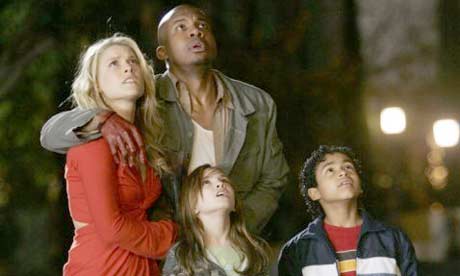Big Brother dominates MediaGuardian's top twenty stories of 2007
 It was, of course, a media news year dominated by Celebrity Big Brother. We reveal the most popular 20 stories of 2007 on MediaGuardian.co.uk:
It was, of course, a media news year dominated by Celebrity Big Brother. We reveal the most popular 20 stories of 2007 on MediaGuardian.co.uk:
1 Why does everyone hate me?
Thousands of viewers complained about the racist bullying of Shilpa Shetty on Big Brother, but Germaine Greer thought we shouldn't be surprised because it represented the widespread bigotry of British society.
17 January 2007
2 Girl, 14, appeared topless in FHM
FHM was censured by the Press Complaints Commission after it published a topless photo of a 14-year-old girl without her consent.
11 September 2007
3 Jade evicted as poll reveals public anger with Channel 4
Jade Goody was evicted from the Celebrity Big Brother house after 82% of viewers voted against her, and Goody admitted she was "embarrassed and disgusted" by her own behaviour.
20 January 2007
4 Big Brother racism complaints soar
The number of complaints about alleged racist abuse on Celebrity Big Brother grew to 4,500.
16 January 2007
5 Newsreader's anger over Paris story
The release of Paris Hilton from a Los Angeles jail made headline news, but one US cable news presenter refused to read out the story as a lead item on a popular morning breakfast show.
29 June 2007
6 Reuters gets that sinking feeling over Titanic stills
News agency Reuters admitted that footage it had aired purportedly showing Russian submersibles on the seabed of the North Pole actually came from the movie Titanic.
10 August 2007
7 New race row hits Big Brother
Big Brother contestant Emily Parr was removed from the show after calling fellow housemate Charley Uchea a racially offensive name.
7 June 2007
8 With prejudice
Unofficial sources and the demands of 24-hour news have led to a media storm around Gerry and Kate McCann.
17 September 2007
9 Guardian columnist Dina Rabinovitch dies
Dina Rabinovitch, the Guardian columnist, lost her long-running battle with cancer.
30 October 2007
10 Duncan's darkest hour
The political and social storm over Big Brother exposed a crisis of leadership at Channel 4.
22 January 2007
11 Guardian Viral Video Chart
Two reluctant puppies dressed in Halloween Star Wars outfits stole the Viral Video Chart show.
2 November 2007
12 Racism, ratings and reality TV: now Big Brother creates a diplomatic incident
Complaints over Channel 4 show hit record 22,000, while police say they are to investigate abuse of Bollywood film star.
18 January 2007
13 Celebrity Big Brother row goes global
The row over the alleged racist bullying of Celebrity Big Brother star Shilpa Shetty reached the world of international diplomatic relations.
17 January 2007
14 Shilpa complains of racism
Celebrity Big Brother contestant Shilpa Shetty accused fellow housemates of racism as complaints about the programme topped 30,000.
18 January 2007
15 Jim Davidson's Hell's Kitchen exit
Jim Davidson was kicked out of Hell's Kitchen for referring to "shirtlifters".
12 September 2007
16 Apple to launch new iPod
Apple gears up to announce the sixth generation of iPods, prompting fervent speculation about how the technology giant will develop its market-leading MP3 player.
4 September 2007
17 Media Diary
Monkey's most popular diary of the year noted how emails to Telegraph.co.uk's bloggers always seemed to get leaked to MediaGuardian, and revealed that Channel 4 News presenter Jon Snow would be appearing in a promo wearing just a loin cloth.
2 March 2007
18 TV contestants to compete for woman's kidney
A Dutch reality television show pushes the boundaries of reality TV in a show where a terminally ill woman selects one of three contestants to receive her kidneys when she dies.
29 May 2007
19 Celebrity Big Brother Live: Shilpa v Jade
Janine Gibson covers Big Brother eviction night live on Organ Grinder after the racism controversy.
19 January 2007
20 Watch the Guinness 'Tipping Point' TV ad
Guinness launches the most expensive TV ad in its 80-year marketing history with a domino rally that features cars, flaming hay bales and grandfather clocks.
8 November 2007
9/20 stories were related to big brother,showing that unimportant soft news dominated the media stories, something like the Mccann's only featured once but BIG BROTHER, has so much coverage probably because of the racial abuse on the show.these things have to be considered. i chose this story because not only is big brother important in the media news, but in the news and in TV in general, big brother is constantly heavily advertised and sponsered, and is international! ! ! !
BIG BROTHER IS...BIG ! ! !





